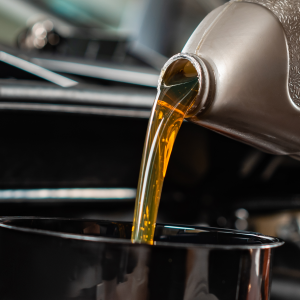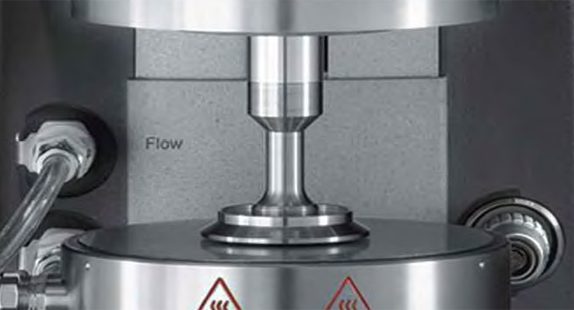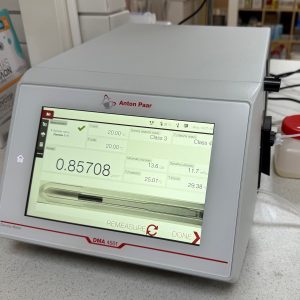
At our lab we now deliver highly reliable, kinematic viscosity values for a broad range of liquids—from fuels and lubricants to pharmaceutical solutions and personal care products. Measurements can be performed across a temperature range of 0°C to 100°C, ensuring accurate results even in challenging environments. Based on externally supplied density data we can extend this temperature range from -45°C up to 400°C.
What Is Kinematic Viscosity?
Viscosity, in general, describes a fluid’s resistance to flow, but there are two fundamental ways to measure this quality:
Dynamic Viscosity (Absolute Viscosity):
This measures a fluid’s internal resistance to flow and is typically expressed in units of Pascal-seconds (Pa·s) or Poise (P), or more commonly milliPascal seconds (mPa.s) or centiPoise (cP). Dynamic viscosity gives you a direct look at the forces acting within a liquid.

Kinematic Viscosity:
This represents the ratio of dynamic viscosity to the fluid’s density. Expressed in mm²/s or centistokes (cSt), kinematic viscosity provides insight into how quickly a fluid flows under the influence of gravity.
Because it factors in density, kinematic viscosity is especially useful when comparing fluids under similar conditions and predicting how they will behave in practical applications.
By calculating kinematic viscosity as the ratio of dynamic viscosity and density, our derived approach offers enhanced accuracy, practicality and reliability.

This is a very similar approach to that taken with the Stabinger Viscometer (ASTM D4052, DIN 51659) where dynamic viscosity and density are measured and kinematic viscosity then calculated.
However, our approach also allows us to address the complexities of any non-Newtonian behaviour observed in the fluids tested and to maintain robust temperature control for high-quality measurements.
International Standards and Calibration
We ensure our testing protocols meet the highest industry benchmarks, with viscosity and density measurements in full compliance with internationally recognized standards:
- Our dynamic viscosity measurements are performed using rotational instruments with measurement systems that conform to DIN53019, ISO3219 and ASTM D4287.
- Our density measurements internationally recognized standards including ASTM (D4052, D5002), DIN 51757, and ISO (2811-3, 12185) and pharmacopoeia standards including Ph. Eur. 2.2.5 and USP 841,
Our equipment is consistently calibrated at regular intervals with confirmations performed with traceable standards.
Advantages of the Derived Measurement Approach
Our integrated approach to deriving kinematic viscosity brings several key benefits:
Enhanced Accuracy:
By calculating kinematic viscosity from high-quality dynamic viscosity and density measurements, we reduce uncertainty and deliver superior precision. This method ensures your final values truly reflect the fluid’s behaviour under practical conditions.
Adaptability for Complex Fluids:
Many fluids, especially non-Newtonian liquids, can be challenging to measure directly. Our derived approach handles these complexities with ease, providing reliable values where traditional measurements might struggle.
Robust Temperature Control:
With a measurement capability spanning from 0°C to 100°C, our system eliminates temperature-induced variances, ensuring that every reading is as accurate as possible—even when testing temperature-sensitive liquids.
Streamlined Process and Rapid Turnaround:
Our combination of dynamic viscosity and density measurements into a single derived value accelerates the testing process. Clients benefit from both high precision and speedy results, which is essential for maintaining smooth operations in research and quality control.
Real-World Applications
Our high-quality, derived kinematic viscosity measurements empower a wide array of industries. Here are a few examples of materials we commonly analyze:
- Automotive Fuels and Lubricants: Ensuring optimal performance under extreme conditions by understanding how oils and fuels flow.
- Pharmaceutical and Chemical Solutions: Monitoring consistency in formulations where precise viscosity data is critical for efficacy and safety.
- Beverages: Assessing the flow characteristics of spirits, wines, and beers to maintain quality during production.
- Personal Care Products: Measuring viscosity in lotions, creams, and other cosmetic products to guarantee a pleasant, consistent experience.
Your Trusted Partner in Precision Measurement
We offer a full-service analytical experience. From initial consultation through to detailed reporting, our dedicated team stands ready to assist you every step of the way. Our rapid turnaround times, combined with comprehensive technical support, ensure that your projects keep moving forward without delay.
Discover how our advanced kinematic viscosity measurement services can optimize your quality control and research initiatives. Contact us today to learn more about our capabilities and how we can help streamline your projects with precision and efficiency.
